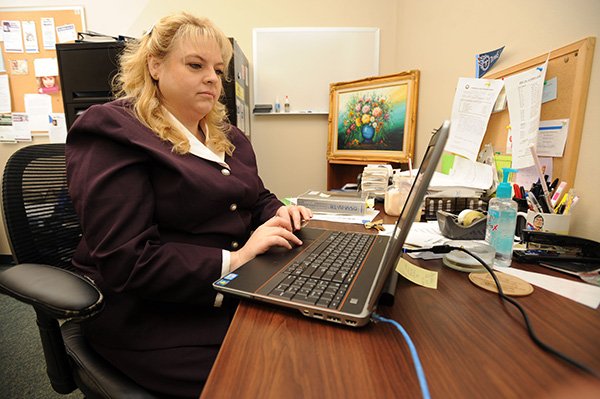FAYETTEVILLE —Washington County officials want to turn the Juvenile Detention Center into a frontline for social services to treat young offenders with mental health issues.
Studies show 70 percent of youths in the juvenile justice system have a diagnosable mental health issue, according to an annual report released by the detention center earlier this year. The report also states 60 percent have substance abuse issues.
The Quorum Court on Thursday approved hiring a second, full-time social worker at the detention center on Clydesdale Drive. The new position will cost $31,231 in wages and benefits for the rest of this year.
The county has employed one full-time social worker since 2004. That person supervises college student interns who screen incoming juvenile inmates for health and substance abuse issues, said Jean E. Mack, detention center director.
The social worker is stretched by the demands of supervising interns, interacting with clients and their families from juvenile court hearings, and handling probation cases and juveniles in the detention center, she said.
“I don’t want people to think we’re growing government,” Mack said. “We’re meeting the needs of a growing community.”
Social services help reduce repetitive crime by the same offenders, also known as recidivism.
By The Numbers
Juvenile Arrests
Police arrested 186 juveniles in Fayetteville and 887 in Springdale in 2012. The top five crimes that lead to arrests of youth under 18 are listed below:
Fayetteville
• Shoplifting: 64
• Narcotic: 26
• Vehicle break-in: 17
• Assault: 11
• Battery: 9
Springdale
• Curfew violations: 102
• Shoplifting: 74
• Purchase, possession of alcohol: 54
• Runaway: 47
• Flight from officer (foot): 41
Source: Fayetteville, Springdale police departments
About 40 percent of the juveniles in the detention center in 2012 received social services, such as clinical assessments, case management and brief therapy, according to the report.
The report states 16 percent of the county’s youth who received social services from July 2007 through December 2011 were again arrested and incarcerated at the detention center. That compares to the recidivism rate of 29 percent who did not receive services. The national recidivism rate is 69 percent.
The county’s annual report shows a decrease in detention center commitments from 740 in 2011 to 649 last year. The number of commitments in 2008 was 915.
By The Numbers
Juvenile Detention Center Intakes
The Washington County Juvenile Detention Center recorded 649 intakes in 2012. The top 10 offenses:
• Probation violation (misdemeanor): 99
• Family in Need of Support petitions: 81
• Controlled substance violation: 64
• Probation violation (felony): 46
• Battery, third degree (misdemeanor): 43
• Burglary (felony): 41
• Theft of property (misdemeanor): 37
• Theft of property (felony): 36
• Assault (misdemeanor): 26
• Fleeing (misdemeanor): 26
Source: Washington County
“I would credit that to our diversion programs,” said Norma Orellana-Frisby, lead probation officer. “We have worked hard to keep our clients out of detention.”
Springdale and Fayetteville police data shows juvenile arrests were flat from 2011 to 2012. Police in the two cities arrested 1,073 juveniles in 2012, or 16 more than the year before. U.S. Census Bureau estimates showed the county’s population grew by 3,610 from July 2011 to July 2012.
Most first-time offenders are given probation and put into diversion programs, she said. The county operates several programs, including Hooked on Fishing Not on Drugs and the Aikido Agatsu (Victory Over Oneself) Program aimed to improve self-esteem, respect authority and teach self-defense.
A juvenile court judge often asks that a youth be assessed for treatment, Mack said. More social workers means more comprehensive assessments and referrals to organizations such as Youth Bridge, she said.
Youth Bridge, a nonprofit organization, works with youth and their families on abuse, addiction, homelessness, mental health issues and behavioral problems.
“The drug courts and people at the juvenile detention center are doing a good job to find programs and work with people like us,” said Philip Bode, Youth Bridge spokesman.
The county needs two social workers with master’s degrees and two with bachelor’s to provide services to all juveniles entering the detention center, in probation or ordered by a judge, Mack said.
“Within the next five years, hopefully, we’ll have that all complete,” Mack said.

